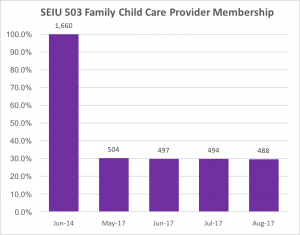In 2014, the U.S. Supreme Court ruled in Harris v. Quinn that government unions could no longer force “partial-public employees” like homecare workers and family childcare providers to pay union dues against their will.
The court observed, among other things, that the scheme was nothing more than an enormous political money-making operation for the union leaders – most of whom charged inordinate fees while providing very limited services to the individuals who were forced to pay.
Union leaders, who rely on the money to maintain their political clout, decried the decision and promptly reacted in two very paradoxical ways.
Publicly, unions like SEIU 503 voiced optimism that homecare workers and family childcare providers would value their union and keep maintaining their financial support. Privately, they rushed behind closed doors and began devising a host of procedural requirements designed to flout the court’s ruling and keep caregivers paying against their will.
New data prove which of their instincts was correct.
Not only have thousands of homecare workers successfully opted out of SEIU 503 thanks to the Freedom Foundation’s campaign to promote Harris v. Quinn, but recently obtained numbers from the state of Oregon via a public records request also show SEIU 503’s childcare membership is in a complete free fall.
Since the Harris ruling, more than 70 percent of family childcare providers in Oregon have ceased paying union dues to SEIU 503, leaving the union’s child care ranks at only 29 percent as of August of this year.

And it doesn’t stop there. The data show the decline in SEIU’s dues-paying childcare membership follows the exact same trend as the homecare population, meaning the number of these workers supporting SEIU 503 steadily declined over the summer months of 2017.
So what do these two groups have in common?
Two things.
First, both groups have the constitutional right under Harris v. Quinn to opt out of paying all union dues or fees. Second – and just as importantly – they have the Freedom Foundation to help them exercise it.
Specifically, they’ve been the primary focus of the Freedom Foundation’s multi-pronged approach to labor reform that revolves around informing public employees of their right to opt out of union membership.
And while there are admittedly far fewer family childcare providers than homecare workers in the state, that doesn’t make their rights under Harris v. Quinn any less significant.
Nor does it make their proportional impact on SEIU 503’s dues revenue any less gratifying.
In addition to protecting employees’ individual rights, the Freedom Foundation’s comprehensive Harris opt-out campaign has proven to have far-reaching effects on the undue political influence of government unions in Oregon.
If not for the Harris ruling and the Freedom Foundation’s tireless efforts to enforce it, for example, SEIU 503 would still be extracting approximately $375,000 in dues each year from family childcare providers’ paychecks alone. (assuming current employment levels).
Instead, SEIU now claims less than a third of that amount.












